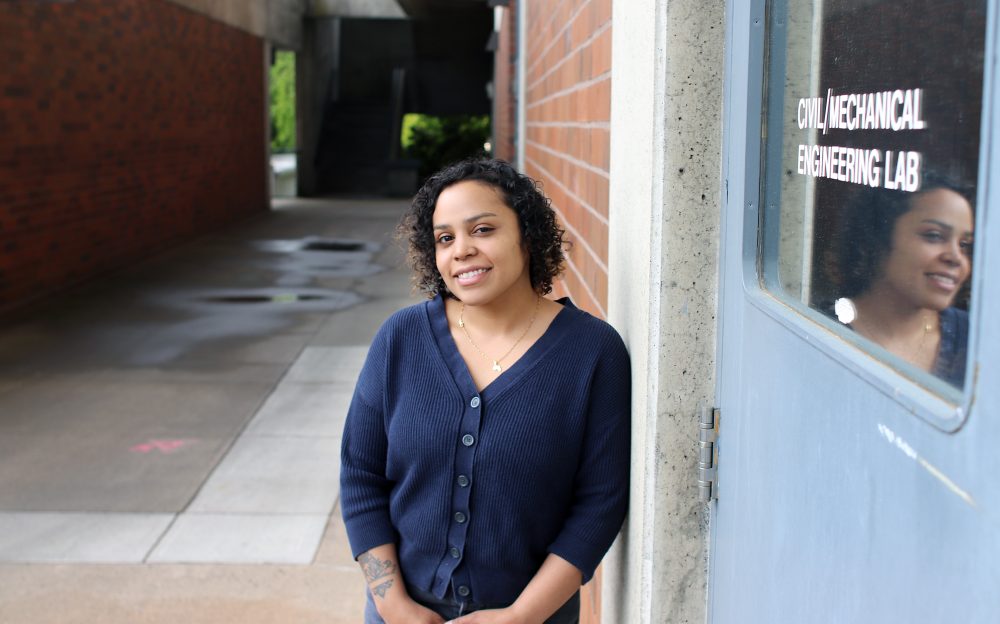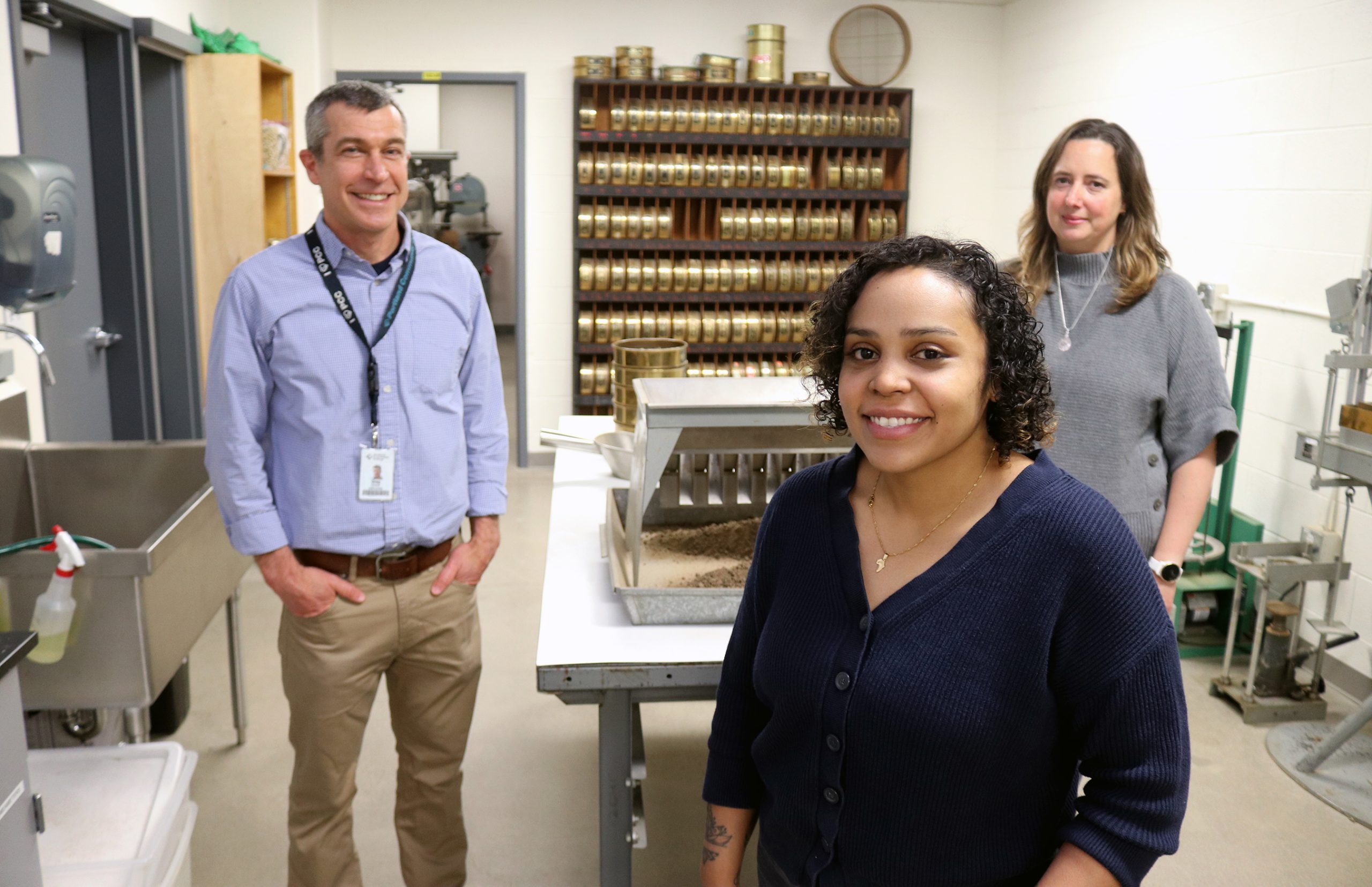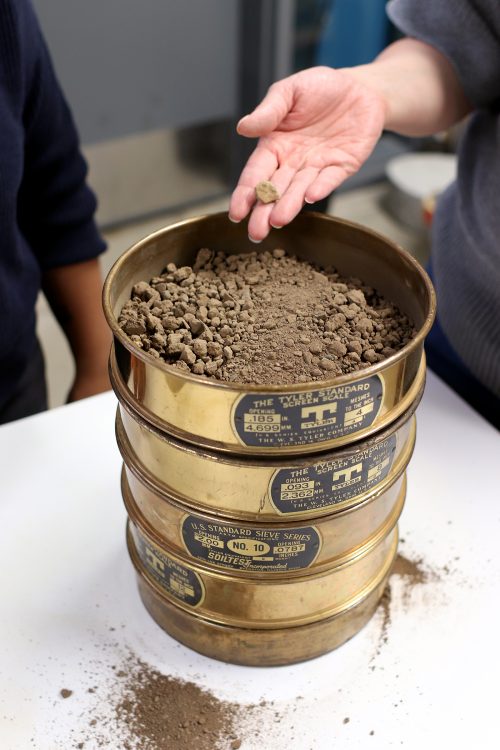This content was published: June 13, 2022. Phone numbers, email addresses, and other information may have changed.
Pandemic proof degree provides career pathways for engineering students
Photos and story by James Hill

PCC’s Ellissa Stevenson is proof that the field of civil engineering has been pandemic proof and career options are growing.
Tigard’s Ellissa Stevenson had reached a point where she was ready to start her college career. She spent days going over degree offerings at Portland Community College to see what fit her goals and interests. As it turns out, she didn’t have to look far.
“When I read the ‘Civil and Construction Engineering Technician’ description, I was instantly intrigued,” Stevenson said. “I did more research on it and after a few days decided it was the path that I wanted to take.”
Today, Stevenson is in the progress of earning an associate degree in Civil and Construction Engineering Technology. Once she graduates, she plans to directly enter the civil engineering field as a technician, but eventually she wants to use the credits she has built up to transfer to a four-year university and earn a bachelor’s degree in civil engineering.
“So far, I have learned so much about the civil engineering world,” said the Tigard High School graduate. “We have learned a lot about concrete, infrastructure, water systems and how these designs are essential to a working world. I think that has been huge in learning the foundation of everything so far.”

Academic Pathways: Science & Engineering
Civil and Construction Engineering Technology Program is just one of many pathways within PCC’s science and engineering offerings. Launch your professional career in one of these programs or earn credit with science classes that will transfer to a university.
The field of civil engineering has been pandemic proof and able to grow its business despite other industries being hampered by the impacts of the virus. As a result, jobs in this field continue to grow and the need for trained workers is increasing.
In response, PCC created the Civil and Construction Engineering Technology Program, which is based at the Sylvania Campus in Southwest Portland. It offers a two-year associate degree – 10th highest paying career with a two-year degree – that provides technician training for employment within the public and private infrastructure construction and maintenance fields. The curriculum incorporates hands-on training with the latest in technology. CCET emphasizes materials testing, inspection, plan reading, surveying, project management, civil computer-aided drafting (CAD) and Building Information Modeling (BIM).
Faculty are training qualified workers for jobs in local municipalities like the City of Portland, City of McMinnville, Washington County, as well as private companies like Westlake Consultants and Black & Veatch.
“This is a new program that was created using industry input,” said Tara Nelson, faculty chair of the program. “It offers a blend of remote learning, online and hybrid courses. Program faculty and staff are supportive and responsive and will create opportunities to learn in a mixture of both online and face-to-face. This is a program for students who want to make a difference in their community.”
For Stevenson, who works full-time as an e-commerce manager at a local grocery chain, it’s a pathway to a new career. Since she was 17, she’s always been working to help her mother pay bills and just get by.
“That really became a hurdle for me because once I graduated high school I needed to keep working,” said Stevenson, a mother herself of two small children. “I put my education in the background and focused on work until I felt comfortable enough, and well off enough, to jump back into education and figure out what degree I wanted to get. This made me stronger.”
Stevenson has been well supported by her instructors with her training and finding internships for the summer. She has been able to pursue options with many different companies and experience various career paths within the civil engineering field. This has helped her to see a lot of different options that can come out of her CCET degree. As a result, Stevenson recently accepted a summer internship with Stacy & Witbeck.
“The value of going to PCC is that the staff are really caring and want you to succeed,” she added. “I think anyone who wants to succeed here can, and it’s a great welcoming, inclusive environment. The CCET program is so great and has been preparing me for my future career.”
For more information about the Civil and Construction Engineering Technology Program, visit pcc.edu/ccet, or PCC’s admissions website at pcc.edu/enroll

